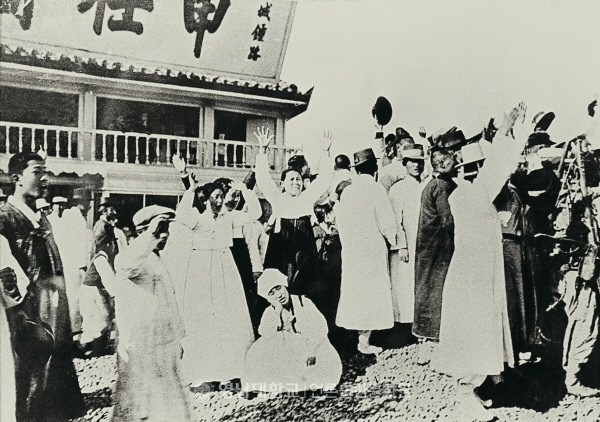
The March 1st Independence Movement is a historic day to commemorate when the Korean people protested against the Japanese colonial rule on March 1, 1919, and announced their declaration of independence to the world. At that time, the Declaration of Independence and the Independence Movement took place, regardless of occupation, age, region or religion. According to those who experienced it first hand, the harsh voices of people waving the national flag in the various parts of the country and crying out “Long live Korean independence” swept over the Korean Peninsula. According to The Bloody History of the Korean Independence Movement written by Park Eun-sik, more than two million Koreans, around 10% of the entire population, took part in the movement. Among them, about 7,500 people were killed and 16,000 were injured, and more than 46,000 people were arrested by the Japanese police purely for participating in the movement. The Korean people could have been excited enough because of the sound of the Independence Movement, yet Japanese police and soldiers did not hesitate to use violence on everyone. As such, all the excitement that had been created was extinguished by Japan. No Japanese civilians were killed by the demonstrators during the March 1st Independence Movement, which lasted more than two months. Through this fact, we can say that the March 1st Independence Movement was itself a movement of democracy, peace, and non-violence. Most of the people who participated in the March 1st Independence Movement and covered “Long live Korean independence” in the whole country are not well-known heroes. They were farmers, shoemakers, students, and housewives. We can deduce that the independence of the country was a matter of survival and defining the times.
The March 1st Independence Movement has three meanings. First, the movement became a good opportunity to establish a democratic republic government with the provisional government in the Republic of Korea. Second, there was a change in the way the Japanese colonized us. For example, some freedom of speech, assembly, and the association was allowed, and this change was extended to the activation of the national and social movements. Finally, it played a leading role in the Asian national movement. Our sovereign and independent movement stimulated the Asian anti-imperialist movement, including China's 5.4 movement and India's non-violence movements.


